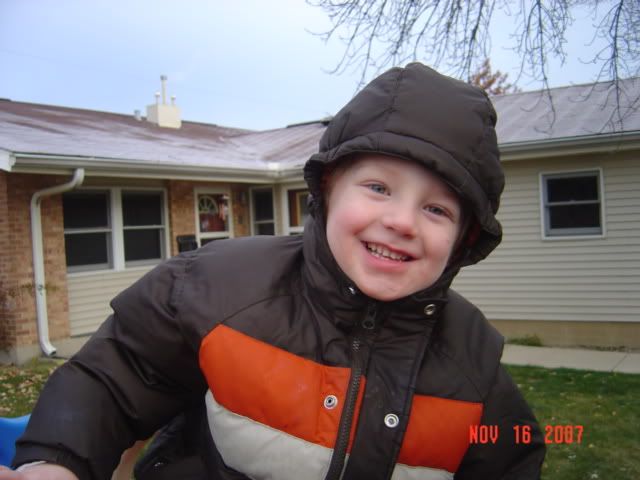My First True Love
"My First True Love"
Abstract
The following essay concentrates on the critical thinking process, as well as the role of language in this process and in the act of persuasion. The English language is full of limitless word combinations, which promote an in depth thought process called critical thinking. Like the possible combinations of words to form a thought, there are also many perspectives from which to view a thought. The more language we acquire, the better armed we will be to understand these multiple perspectives.
I will open the essay with a recollection of my first true love . . . my first born son. In this writing, I will attempt to use the art of metaphors to convey the emotional attachment that still exists in my heart today.
Afterward, I will attempt to answer the following questions:
1. What role does language and language diversity play in the critical thinking process?
2. How does language empower or limit the expression of our thoughts?
3. What is the role of critical thinking in persuasion?
We met face-to-face for the first time what seems like yesterday, but years have passed, and I have known you for a lifetime. You have led me on a remarkable journey through this forest of existence, and have taught me to cherish every detail. You have guided my feet toward a less traveled pathway, and on it, you have opened my eyes to a world full of treasures all others have taken for granted, cast aside or completely ignored.
I knew of you before our initial encounter. Your presence shadowed my youth and enchanted my every thought. Your spirit meandered through my mind and tickled my mothering instincts in my early adult years. Fantasy manifested your silhouette, as we danced nightly in my dreams. In my mind, I cradled your frame and struggled to bring you into focus, but the intense glow behind you commanded your features obscured. I had always wondered when reality would bring you to my conscious arms.
As I matured, I kept my hopes of you alive. As an adult, I carried out my daily tasks with work and school, social life and family. Finally, the prospect of our rendezvous became reality. My innermost void filled as your thriving presence made itself known with faint whispers of internal motion. Still, I fell in love with a dream too distant to be genuine.
After a few months time, though, the whispers escalated to rhythmic, seemingly choreographed, movements. I pressed my hands to my abdomen, felt the gentle sways and we dance together just as I had dreamed.
An eternity of days had past. We were mere moments away from our formal introduction, yet I felt lost in the uncertainty of it all. My body had been tormented by twisting, wrenching, intolerable pain for so long, I thought I had lost my chance to see your face. Then, your cry cut through the agony and filled my strength with the courage of a thousand soldiers. All I could hear was your voice beckoning to me from across the room.
After the longest moments I had ever experienced, you were presented to me swaddled in a receiving blanket, exposing only your face. Through tears of pain and joy, I looked into your eyes. A sense of peace flooded my entire being, and the world stood still. Every visible object and every audible distraction in the periphery was drowned out by the silence shared between us . . . I lost myself.
We maintained an uninterrupted gaze as your eyes penetrated my physical features and captured my very soul. I thought to myself, “How could one little face capture and breathe new meaning into the mere essence of every wonder in this world?” All my yesterdays had become the sands absorbed in the tidal waters and cast out into the Forgotten Sea. All that mattered in life was from this moment on. I held, in my arms, proof that life was meant to be.
Language permits us to describe an event in such a way that the receiving party feels as if they were actually there, experiencing the occurrence first hand.
Language allows us to explore the minds of others and interpret our own meaning from their words. Language takes us on a journey, allows us to explore our world, discover unique perspectives, and review our own emotions. We can view the world with the innocence of a child, taking fascination in every observation, picking apart every detail, and amazing our selves with our own creativity.
The English language very few words of its own. Most derive from other dialects across the globe, and then modified in one way or another to suit the speaker or writer. Within our multicultural nation, though, the English language is so diversified that many English-speaking people cannot understand one another. Accents and intonations make it difficult to comprehend a great deal of what is being said.
A diverse vocabulary enables a person to speak or write to a prismatic population. If the content of the message is clear and powerful, it provokes thought and will be understood. The more words that circulate through your head, the better you observe. A keen observer with an extensive vocabulary can affect their audience on a personal level by means of conveying a thought that appeals to people from multiple backgrounds.
Language either empowers or limits the expression of thoughts. Words are powerful if used wisely, yet meaningless or confusing if translated the wrong way. The key is to know your audience and to speak to their emotions. Words that have meaning and structure allow a person to visualize the subject and key points, and consequently remember more.
On the other hand, the observer or speaker/writer who has a limited vocabulary will also limit their thoughts concerning the observation. If the observer cannot find words to describe the subject matter, then the recipient cannot materialize it.
Critical thinking is central to persuasion. We see this concept on a daily basis, sometimes without our knowing. For example, television advertisements are one of the best uses of critical thinking skills to “sell the product.” Advertisers know the power of words, context, thought, and emotion and so they use critical thinking skills to “get the message across.”
Most commercials are categorized in one or all of three subject headings: informative, emotional, or explanatory. In these twenty to forty-five second bursts of thought, the advertisers must persuade the public to buy their product or service. If they hone in on words or visual stimuli that appeal to people on an emotional level, the audience’s attention is captured long enough for the informative or explanatory words to relate that emotion to the product or service.
Critical thinking and language work in collaboration with one another. One simply cannot create thoughts without having the words to identify them. The thinking process also involves our senses in more ways than one may believe.
Think of how a certain smell, feel of a specific type of material, or taste can instantly take you back to that exact moment in time where your memory was created, as if captured by a camera within your mind. Your recollection may have nothing to do with the sense that clued you into that distinct memory, but your brain stored that memory by means of relating it to a particular sight, sound, taste, or feel. Therefore anything that promotes one's five senses will also provoke memories and thought.










































































1 comments:
That just made me cry!!!
That is SOOO beautiful~ you are such a talented writter:)
I have a 4 year old son who is also "my first true love" so I know how you felt when you say you, lost yourself!!!!
Post a Comment